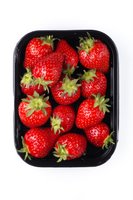They buy as much of their produce as possible from a store that stocks fuit and veggies grown in Colorado. Open the fridge, and most products are labeled as being organic. They rarely eat meat and when they do, it's grass-fed, and hormone-free.
These two are among the only people I know who have so wholeheartedly embraced the concept of reducing their impact on the world around them. They are not contributing to produce being flown or driven all over the world, they are not contributing to the destruction of land by overgrazing with cattle, and they are not supporting use of pesticides and other harmful chemicals in the environment.

Now for my confession: I bought 5 pints of strawberries from California yesterday because they were such a good deal, and I probably couldn't find an "organic" label in my refrigerator if I opened it right now.
Despite understanding the benefits of buying local food and organic produce, I am still lured by low prices. Seeing someone actually act out the principles of buying locally and organic caught me off-guard. I know the theory is great, but a little guilt thrown in by seeing someone act more responsibly than me is helpful too!
So - I'm starting to think a little harder about what I'm buying. After all, there's NO reason to buy tomatoes from the U.S. if I can get some grown in Ontario for the same price. Baby step number one.
Now on to the next step - which I believe is appealing to my cheap side by thinking carefully about the true cost of unmindful grocery shopping. I'll be starting here: with a good read about "food miles" (comes in England, but you'll get the drift).
2 comments:
Happy Owl, did you read/hear about the couple in BC who tried to only eat food grown within 150 km of their home for an entire year? They started off as vegetarians, but ended up eating a lot of fish and/or meat. The winter, obviously, was extremely challenging for them.
I have mixed feelings about organic food. Certainly, reducing pesticide use is a noble goal. But (as Dirty Bird and I have found) there is often a lot of waste with organic produce as it tends to go become infested or go bad quickly.
Hey, the previous commenter beat me to my post but here's the link to the articles in the 100 mile diet series. http://thetyee.ca/Series/2005/06/28/100Mile/ It's very inspiring and has certainly made me think more about what I eat and where it comes from. Also, working with farmers in B.C. has made me more aware of the importance of trying to support local growers.
Simone
Post a Comment